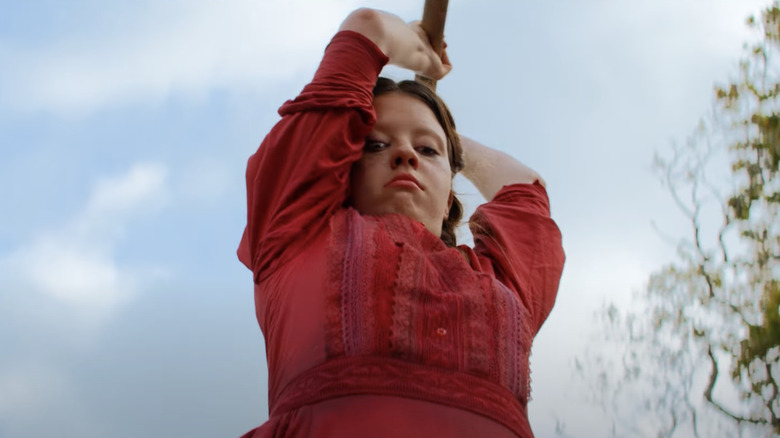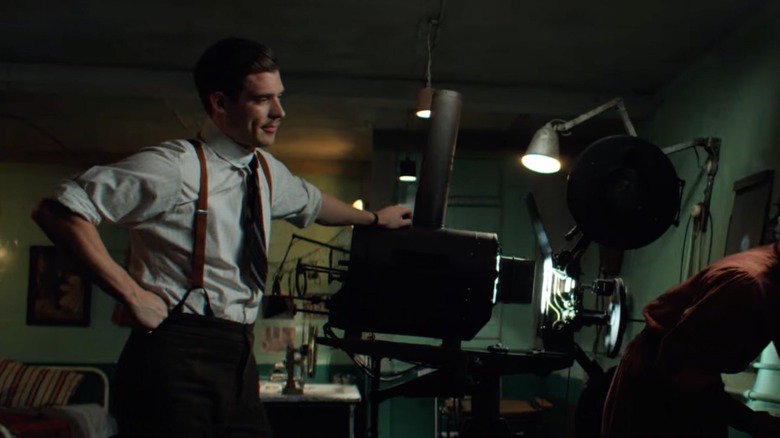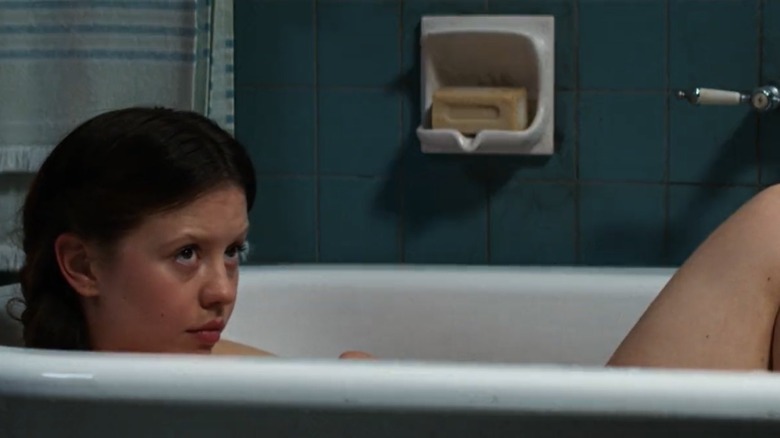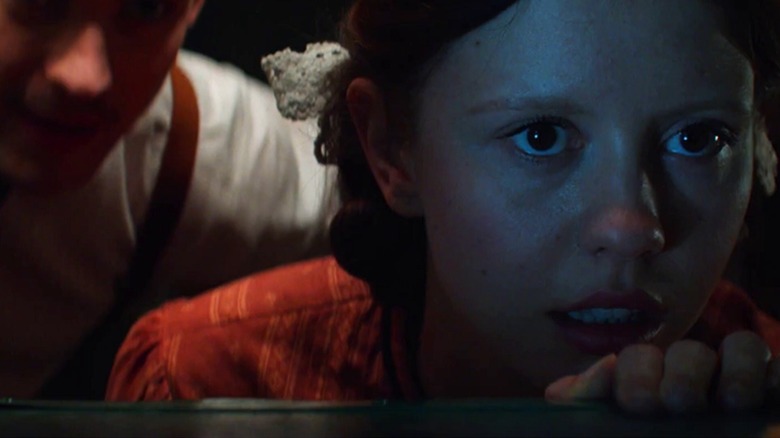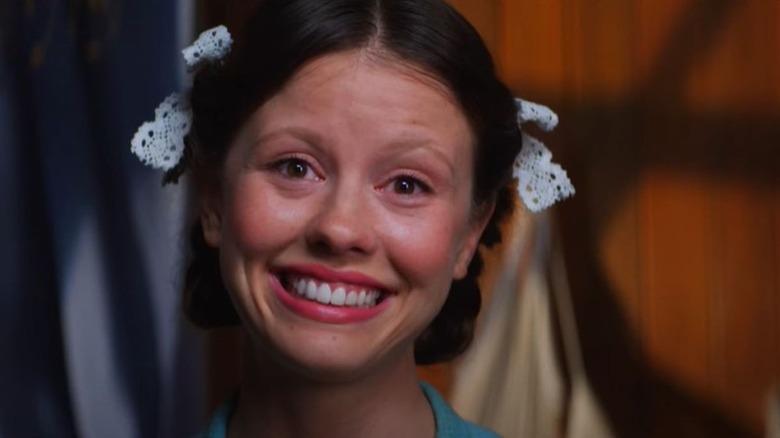Mia Goth, David Corenswet, And Ti West Want You To Care About The Tragic Motivations Of Pearl [Exclusive Interview]
This interview contains mild spoilers for "Pearl."
In Ti West's "Pearl," the prequel to his slashing, smash-hit return to horror, "X," Mia Goth dazzles as a young farm girl with dreams of stardom in the midst of the 1918 influenza pandemic. Feeling trapped and isolated on her family's farm, Pearl is responsible for not only tending to the animals, but also caring for her disabled father under the harsh and overbearing rule of her German immigrant mother. As Pearl yearns for a glamorous life under the stage lights, it becomes quickly apparent that Pearl will stop at nothing to pursue her ambitions and become the star she knows she's meant to be.
While "X" was a love letter to the indie horror auteur days of the late 1970s, "Pearl" is noticeably styled after the golden age of Hollywood, boasting 1930s and '40s technicolor aesthetics, a roaring orchestral score, and the classic story about a small town girl with dreams in lights ... well, if the classic small town girl also had a penchant for murder, that is. With "Pearl" now in theaters, I was lucky enough to snag a chat with stars Mia Goth and David Corenswet, and director Ti West, to gather a little more insight into how this slasher soared somewhere over the rainbow.
This interview has been edited for length and clarity.
On the fun of making a period piece
My first question is for Mia. What does the Venn diagram of preparation look like between "X" and "Pearl"?
Goth: Well it all feeds into each other, really, and so when Ti and I first started discussing "Pearl" and the possibility of making a second movie, it was always a big maybe and we always said, "Well, at the very least this would serve as an amazing backstory to older Pearl in 'X,'" and it was just very exciting. The fact that we then were able to make "Pearl" and A24 greenlit it really did feel like a miracle. It was very informative and sometimes it gets a little confusing talking about the different characters in the different eras and the different movies, but no, all the prep was very useful.
My next question is for David. Your character feels both like a hundred Hollywood greats while simultaneously wholly unique. Were you channeling anyone in particular with your performance?
Corenswet: Honestly, Matthew McConaughey, but only because of the Texas accent. [laughs] I think there was an idea that because the character is a lover of film ...I think for the most part he's living earlier than a lot of the Hollywood greats whose movies I've seen. But the idea is that he sort of aspires to be in that world, that maybe he's setting some of the trends that will become the trends of the 1920s and '30s and '40s was interesting to think about and exciting to play with. One of the fun things about making a period piece is that you know where the world goes, even though the characters don't. You can play with it. You have an advantage over the people who were really living in that time to tell interesting stories and tell stories of people who are forward thinkers and ahead of their time and who dream about the future. So, yeah. That's a fun era to play in for all kinds of reasons.
Goth wanted to explore Pearl's vulnerability
Mia, I loved that you co-wrote "Pearl" with Ti. Your presence on the page is definitely felt through your performance, especially since you're present in every single scene. While crafting this piece in quarantine, what aspects of Pearl's character were you most passionate about exploring?
Goth: I would say her humanity and her vulnerability. And that's probably what I was most looking forward to exploring more in "Pearl." In "X," we meet Pearl and Howard and they're sort of these distant figures and we don't really get to spend too much time with them. And so it was interesting to kind of meet Pearl at a different stage in her life and kind of get to know her in a more intimate way and just kind of really understand her and empathize with her in a way that I wasn't quite able to do in "X."
On 'the real tragedy' of the film
David, back to you on this one. Forgive the expression, but I fully expected The Projectionist to be kind of a "hump and dump" character, yet he stuck around the farmhouse a lot longer than I anticipated. Had Pearl not shown her true colors to The Projectionist, do you think he would've actually taken her away from the farm and off to follow her dreams of stardom in Europe?
Corenswet: Sure, yeah. This was one of my favorite conversations we had about the character. All those farmhouse scenes were some of the first scenes that we shot. So I had sort of a similar feeling to you. I had a lot of trouble. Why is he sticking around? He was nice enough to drive her home, but what's keeping him here when things are so clearly off or bizarre? And Ti explained it really beautifully, which was just like, "He's not a bad guy." He wants to be a good guy and he is one and he wants to be nice and polite. And he does like Pearl. And it's not that he's lying to her or manipulating her, it's that he's a little more fly by the seat of his pants, go with the flow ..."bohemian" is how he describes himself. And so it's just a little confusing when Pearl has taken it so seriously.
I think one of the beautiful things about the film is at the same time as you can relate to The Projectionist and feel like, "Yeah, he actually didn't sign any contracts, he didn't make any proposals, he just floated some ideas" in that moment, or as I did when watching the movie, you really feel for Pearl having set all of her hopes and dreams on this possibility. And the tragedy is not that either of them is a bad person, the tragedy is that they weren't clear enough with each other about the differences in their circumstances. And so they've each heard what the other person has said in a way that the other person didn't mean it. And that's real tragedy where you really can't blame anybody and yet everything has gone horribly wrong.
How Ti West makes his horror movies feel relatable
My final question will be over to you Ti. Throughout your entire filmography, your films are flooded with tour to force performances in horror. What do you think is the key to making a horror movie that allows actors to really shine?
West: I think you just have to give the audience a character that they can relate to. So I'm always trying to put a character in a horror movie that doesn't belong in a horror movie, so that the audience can relate to them and hopefully feel like there's some of themselves in there and then this experience can affect them in a personal way. So, it's hard. Beyond that, it's just a taste thing of just people who I think... I mean, Mia was the second person I met and I was like, "We're done, that's the person." And I can't explain what that is. I suppose I could conveniently say it's the "X factor," but it's hard to say. But if you can anchor a movie around a person that's relatable and believable, then the audience will go on the ride with you. Because there's more to horror than just the killing.
